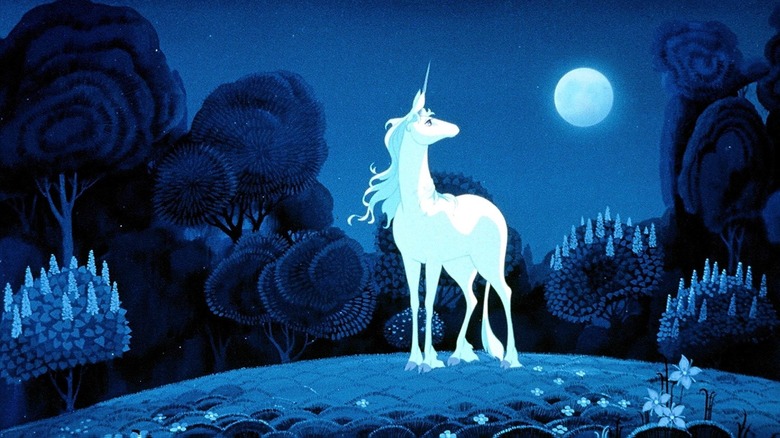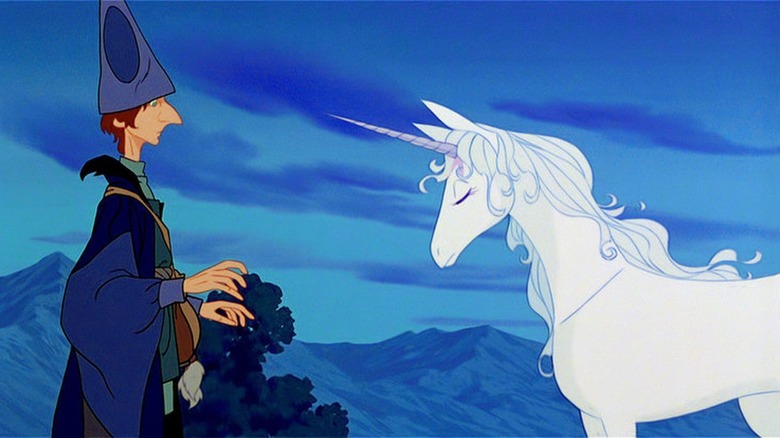Turns Out The Last Unicorn Is A Secret Studio Ghibli Film
"The Last Unicorn" was my favorite film as a child and honestly, remains in my top five even as an adult. The 1982 underrated animated classic is unlike anything that has come before or since. Based on Peter S. Beagle's 1968 novel of the same name (he also wrote the screenplay), the story follows the titular unicorn (voiced by Mia Farrow) as she searches the world for others like her, after hearing she is the last. Along the way, she is kidnapped by the villainous Mommy Fortuna (Angela Lansbury), befriends Schmendrick the magician (Alan Arkin) and Molly Grue (Tammy Grimes), and must contend with the terrifying Red Bull. She also meets King Haggard (Christopher Lee) and his son, Prince Lear. The latter was voiced by Jeff Bridges, who loved the book so much, he practically begged to take part in the film.
There are many weird and wonderful parts that make up this movie, from the film's powerful rumination on regret, to the songs performed by America, to a certain traumatizing scene involving Schmendrick and a Douglas fir. Still, one of the most memorable aspects of the movie is its gorgeous animation. The film came from Rankin/Bass Animated Entertainment, which is probably best known for the 1964 stop motion TV special, "Rudolph the Red-Nosed Reindeer." However, the studio is also responsible for the 1977 animated iteration of "The Hobbit," as well as the 1980 "The Return of the King" adaptation (they didn't hold the rights for the other installments of Tolkien's series). Interestingly, Beagle was actually hired to write the screenplay for Ralph Bakshi's 1978 "Lord of the Rings" adaptation.
Three years after the release of "The Last Unicorn," Studio Ghibli would be founded by Hayao Miyazaki, Isao Takahata, and Toshio Suzuki. Studio Ghibli is, of course, the incomparable studio behind films such as "Princess Mononoke," "Spirited Away," and "Howl's Moving Castle." So, how is this Rankin/Bass production actually something of a Studio Ghibli film?
Rankin/Bass Outsourced Its Animation
The same team who animated both "The Hobbit" and "The Return of the King" was also responsible for "The Last Unicorn." Author Peter S. Beagle told Aaron Golden he was initially quite unhappy with the decision to go with Rankin/Bass because he was not a fan of their previous work. In fact, though it took him a while, Beagle did warm to the film eventually, the animation and performances in particular. The animation is not only staggeringly beautiful, but also quite unique. Though Rankin/Bass was an American company, those lush visuals were actually created in Japan. Beagle's agent Conner Cochran explained in the same interview:
"Here's how it is: Financed in England, produced by Rankin/Bass, American company...but all of the work was being done in Japan, which was a process of Rankin/Bass going to less expensive animators in another country. And they hired –most of the animation was done by a company called Topcraft. And the minute they finished The Last Unicorn, Miyazaki hired them...And in fact, he didn't just hire them, the studio top rep was in financial difficulties, he came in and took them over and bought them up and turned it into Studio Ghibli. So most of the animators and designers who worked on The Last Unicorn, became the core team of Studio Ghibli. And all of those – 'Nausicaa,' 'Kiki,' all of them, the great Miyazaki early movies, were done by many of the same people as who worked on The Last Unicorn."
(Side note: Cochran would later face allegations of financial elder abuse, leading to Beagle obtaining the rights to his work after a protracted legal battle. The situation is still ongoing, but you can learn more about that here.)
It is true that Miyazaki began working with Topcraft on "Nausicaä of the Valley of the Wind" shortly after "The Last Unicorn" was finished. Despite the success of "Nausicaä," Topcraft was soon bankrupt and Studio Ghibli rose from those ashes. Due to its pedigree and style of animation, "The Last Unicorn" is considered by many to be a proto-anime film and Beagle went on to say that they often get invited to anime conventions as a result.
"The Last Unicorn" does indeed share visual similarities with those early Studio Ghibli films and once you know much of the same team was involved in both, it's easy to see the connection. There are many factors that went into making the film the delight that it is, but I can't imagine it would've been nearly as lovely if Topcraft hadn't given it such an unforgettable look.

